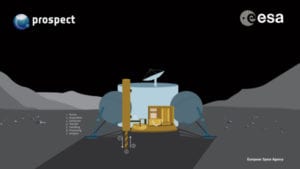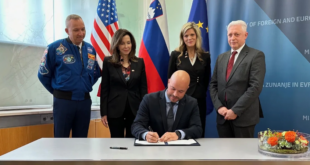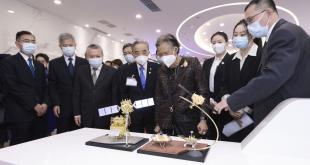
ispace Europe has been selected by the European Space Agency (ESA) to be part of the Science Team for PROSPECT, a programme which seeks to extract water on the Moon.
PROSPECT — which stands for Package for Resource Observation and in-Situ Prospecting for Exploration, Commercial exploitation and Transportation — is a payload package being developed by ESA to fly on the Luna 27, a planned lunar lander mission by the Russian Federal Space Agency (Roscosmos) with collaboration by the European Space Agency to send a lander to the Moon’s South Pole by 2024/2025. The purpose is to prospect for resources such as lunar water ice in permanently shadowed regions of the Moon. The lander will carry several payloads, such as a sampling drill and other instruments to analyse the lunar regolith.
Three members of the ispace Europe team were chosen by ESA to be members of the mission’s Science Team, including Carlos Espejel, Space & Earth Mine Planning Engineer, Abigail Calzada Diaz, Mission Scientist; and, Julien-Alexandre Lamamy, ispace Europe’s Managing Director, and VP of Europe R&D. The team will be part of the group responsible for the planning, operation, and processing data from the mission, as well as the coordination of the PROSPECT lunar instruments. Additionally, Carlos Espejel was chosen as the Lead for the ProsPA ISRU prospecting investigations.
“We’re very proud of Carlos, Abigail and Julien for this achievement and we know they are the optimal choice to serve ESA in this mission,” said Takeshi Hakamada, Founder & CEO of ispace. “Likewise, we’re honoured at ispace to play a role in the realisation of space resource utilisation in the very near future.”
“It’s a real privilege for our team to support ESA in this exciting endeavour,” said Julien-Alexandre Lamamy, ispace Europe’s Managing Director. “We hope that ispace Europe’s role in this mission will be an important factor in positioning ESA at the frontline of the space resources arena.”
ispace is a lunar exploration company with over 85 full-time and part-time staff from 13 countries. The company has 3 global offices in Japan, Europe and the NASA Ames Research Park in the U.S., and has signed agreements with JAXA and The Government of Luxembourg. ispace raised nearly $100 million USD in its Series A funding—more than almost any other space company in history. The funding is being used for its first two lunar missions in 2020 and 2021, which will both launch on SpaceX’s Falcon 9 rocket. The missions are intended to lay the groundwork for high-frequency commercial missions. ispace’s engineers have collective experience working for 5 international space agencies, including NASA.





